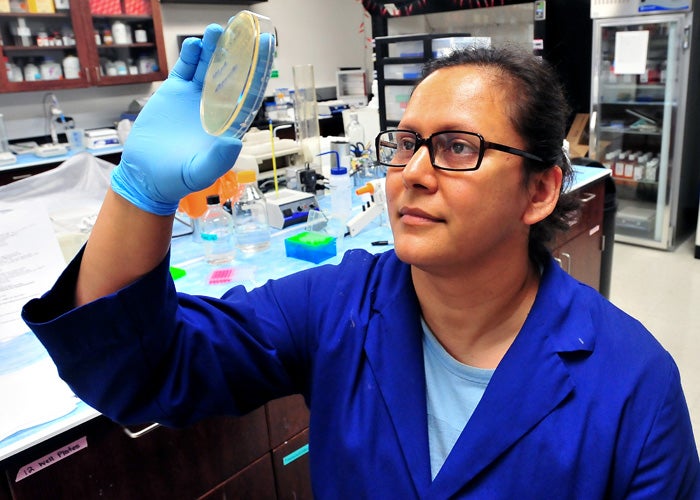
Wednesday, March 13, 2013
[social_share/]
HUNTINGTON, W.Va. – Scientists from Marshall University, along with colleagues at Alderson-Broaddus College in Philippi, have completed a study that may eventually help lead to the development of new treatments for lung cancer.
Their results were published in the Feb. 15 issue of Cancer Research, the most frequently cited cancer journal in the world.
At Marshall, Dr. Piyali Dasgupta, associate professor in the Department of Pharmacology, Physiology and Toxicology in the Joan C. Edwards School of Medicine, worked on the study with her research team of Jamie Lau, Kathleen Brown and Brent Thornhill, and undergraduate students Cody Stover and Christopher McNees.
Researchers in Dasgupta’s lab explore how the various components of tobacco, especially nicotine, advance the progression of lung cancer.
Dasgupta said this study focused on a specific type of lung cancer called bronchioalveolar carcinomas, or BACs, which are known to be associated with smoking. She and the other scientists working on the project looked at the cellular pathways through which nicotine—the addictive component in cigarettes—promotes the growth and survival of BACs.
According to Dasgupta, nicotine itself is not a carcinogen, but studies have shown it can induce the growth and metastasis of lung cancers. It can also protect lung cancer cells against the beneficial effects of chemotherapy.
She said, “In this study, we found that nicotine raised the levels of specific neurotransmitters, or ‘chemical messengers,’ in human BACs. When we used a drug, vesamicol, to interrupt the neurotransmitters’ pathways, the nicotine-induced growth of these carcinomas was significantly suppressed. Our findings are important because they indicate that agents like vesamicol may be useful in the treatment of human lung cancers.”
More information about the research is available online at http://cancerres.aacrjournals.org/content/73/4/1328.abstract?sid=c29c4530-21a3-4652-a977-23b25019258a.
The study was funded in part by a Young Clinical Scientist Award from the Flight Attendant Medical Research Institute.
For more information, contact Dasgupta at dasgupta@marshall.edu or 304-696-3612.
Contact: Ginny Painter, Communications Director, Marshall University Research Corporation, 304.746.1964